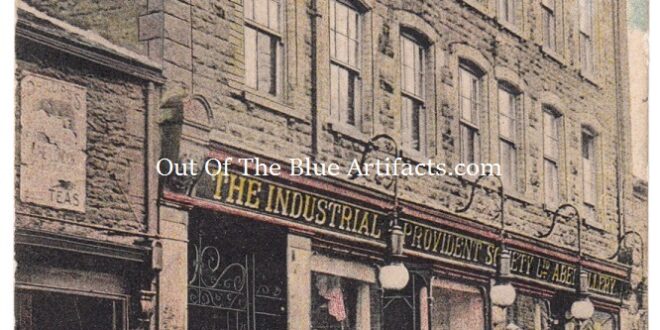The Co-operative Stores Abertillery.
The Beginning.
The Co-operative Group began in the mid 19th century and had its origins in the co-operative consumer societies started by the Rochdale Pioneers. These pioneers were a group of workers who were losing their jobs as the mechanization of the industry were forcing skilled workers out of their employment. This bunch of tradesmen banded together, pooled their money and opened a store selling groceries and other products. From there the Co-operative Group formed and gradually expanded over the years from the merger of many independent retail societies.
In 1863 the independent co-operative societies formed the Co-operative Wholesale Society (CWS) and provided Co-op products to sell at many Co-operative stores.
Abertillery Co-operative Society.
A co-operative retail store at Abertillery was first proposed in 1864 during the miners’ strike at the Abertillery Collieries, namely the Penybont Tillery Colliery, then leased by Messrs G. E. Bevan & Co of Northampton, Hereford and Bristol.
In 1866 the Crumlin workmen held a meeting at the Crumlin Reading Rooms, the men wanted to form a co-operative society at Crumlin. The meeting heard reports from the Rochdale Pioneers Society’s balance sheet and facts brought forward from the Co-operative Stores at Abertillery and Pontypool. So according to this report there was an Abertillery Co-operative Store in the town and must have been established between 1864 and 1866.
The Early Co-operative Pioneers at Abertillery.
As stated, the Abertillery Co-operative Store was established between 1864 and 1866. On the 1871 census this co-operative store was located between Phillips Row and Francis’ Row, somewhere in the King Street area. There was a report in the South Wales Gazette on Friday 25th of March 1910 – The Abertillery Co-operative Society once used the premises later known as the Abertillery Urban District Council Offices, now Davy Evans Court, the housing complex, on the junction of King Street and Castle Street.
The Pioneers at Abertillery.
Following are the names of those associated with the pioneer work in the early days at Abertillery – Mr John Blacker; Mr Henry Webber; Mr Worthy Richardson; Mr Mark Ashley; Mr John Handy; Mr George Handy; Mr John Baker; Mr Henry Warfield; Mr William Spencer; Mr William Silverthorne; Mr James Selway; Mr Henry Selway; Mr Thomas Price and Mr Henry Collier:
The First Manager at Co-operative Store Abertillery.
These gentlemen each contributed £1 and appointed Mr Benjamin Adams as their first manager. As mentioned above, the first store at Abertillery was at King Street. The Abertillery Co-operative Society was in operation for many years though was reported to have been feebly supported.
Abertillery Co-op Becoming a Branch of the Blaina Co-op Company.
It is unclear whether the society had disbanded as of lack of trade or carried on trading in some form or other as in 1888 the Abertillery Co-operative Society decided to become a branch of the Blaina Co-operative Industrial Society, which had been formed in 1872 and under the new manager Mr George Bennett had flourished. This Blaina Co-operative Industrial Society became the parent society in the valleys.
The Abertillery Co-operative Store became the first branch of the parent company at Blaina, from that time profits flourished, from £25 per week the trade trebled. Mr Thomas William Allen of Abertillery was put in place as manager.
The Tin Works Co-operative Society Proposal.
On Friday 18th of April 1873, the Monmouthshire Merlin published a report on Capt. P. S. Phillips, owner of the Abertillery Tin Works. It stated that Capt. Phillips had introduced a weekly pay system and had also placed at the disposal of the men a sum of £200 to start a co-operative society.
Cwmtillery Independent Co-operative Store.
In 1888 the Cwmtillery Co-operative Society Store was established, located at 4 High Street, Cwmtillery, in the grounds of the Cwmtillery Colliery. Prior to this co-operative store Cwmtillery was well provided with company shops, truck shops and the like, although on Thursday 28th June 1888 the South Wales News printed a winding-up order in connection with the General Shop Company Limited at Cwmtillery. A short while later in the same year of 1888 the Cwmtillery Co-operative Society Store was established. Advertisements from 1889 show they were selling, amongst other things, explosives to the colliers who worked at the pit, it seems that the miners were responsible for buying their own dynamite etc as early dockets and pay tickets show deductions for explosives used by the individual.
Mr T. W. Allen.
Mr Thomas William Allen (1864-1943) was born in 1843 at Abertillery, the son of Mr Thomas Allen a miner and Baptist minister. The family lived at Club Houses, Abertillery, in the area of Cwm Street. In 1885 Mr T. W. Allen entered the service of the Blaina Co-operative Society and was later made manager of the Abertillery branch where he built a flourishing business.
The New Store Proposal at Church Street, Abertillery.
In 1889 upon the increase of trade a new store was planned to be built at Church Street, Abertillery, the Co-operative Industrial Provident Society Store.
The Details of the New Store at Abertillery.
In January 1889 planning was announced for the construction of a new Co-operative Industrial Provident Society Store at Abertillery. Tenders were invited, plans were issued and the tender of Mr A. P. Williams of Abertillery at a price of £3,000 was accepted and the building work began.
In August 1890 the tender of Messrs Berryman & Co of the Merchants Exchange, Cardiff was accepted to light their new stores at the Abertillery branch. The plant consisted of one Marshall’s semi-portable engine with one of their Blakey-Emmott patent dynamo’s, seventy Swan Edison incandescent lamps and one Blakey-Emmott arc lamp. It was reported that the installation would be completed within three weeks.
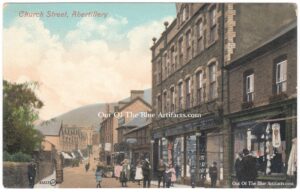 The Official Opening of the new Abertillery Store.
The Official Opening of the new Abertillery Store.
On Monday 6th of October 1890, the Co-operative Industrial Provident Society Store at Church Street Abertillery had been completed and the store was officially opened. The proceedings opened with a procession. The streets of the town were paraded by the co-operators headed by the Abertillery Temperance Brass Band. In the afternoon a co-operative conference took place which was presided over by Councillor W. H. Brown of Newport. The delegates were as follows – Mr Drew and Mr Whitmore (Blaina); Mr Moile and Mr Rees (Blaenavon); Mr Codrington (New Tredegar); Mr David Edwards (Cwmtillery); Mr Coles and Mr Forward (Risca); Mr Thomas Williams (Garndiffaith); Mr John Matthews (Pontnewynydd); Mr John Price District Secretary (Blaina); Mr W. Bryant Statistical Secretary (Blaenavon) and Mr Fred Long of the Wholesale Co-operative Society London.
After the conference a tea was served to the delegates and the public, the waitresses who presided at the tea tables were as follows – Mrs Ashley; Mrs Handy; Mrs Bennett; Mrs Jenkins; Mrs Brewer; Mrs Snellgrove; Mrs Webber; Mrs Davies; Mrs Holer Mrs Coles; Mrs Francis; Mrs Collier; Mrs Richards; Mrs Williams; Mrs Challenger; Mrs J. Williams; Mrs Allen; Mrs A. P. Williams; Mrs Harding; Mrs Prosser: Messrs Ashley, Price and Handy acted as carvers. It was reported that 1,400 people were served with tea during the afternoon.
In the evening a public meeting was held at the Tillery Hall. The platform was occupied by Mr John Price Chairman; Mr Joseph Clay of Gloucester; Councillor Brown of Newport; Mr Fred Long of London: The entertainment was provided by Mr Eli Nash who rendered concertina solo’s Mr Jos Collier gave violin selections. Mr W. J. Collier gave comic songs accompanied by Mr Challenger and Miss M. A. Evans.
Description of the Building.
The new Co-operative Industrial Provident Society Store at Abertillery was a three-storey high building, built with blue stone relieved with buff and red bricks and also terracotta work. There were two shops devoted to grocery and drapery departments, the upper floors in the grocery section being devoted to warerooms, while above the drapery department there was a spacious workroom on the first floor and a suitable committee room on the second floor. The shops were fitted up by Messrs Parnall and Co of Bristol. The premises were illuminated by electric light, which was introduced at a cost of £600. The electric engine house and stables were situated at the back of the building.
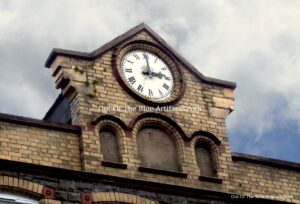 The Turret Clock.
The Turret Clock.
The building was topped with a tasteful clock turret with a clock inset (as seen left).
The clock was supplied by J. W. Benson of London, a celebrated clock maker who made clocks for the Admiralty and the Royal family.
The Contractor and Architect.
The contractor was Mr Alfred Prosser Williams. Mr James McBean was the architect.
Mr Alfred Prosser Williams.
The builder Mr Alfred Prosser Williams was one of Abertillery’s largest building contractors. He was born on 25th March 1849. He re-built St Michael’s Church, Abertillery, the New Market Hall, Abertillery, the Globe Hotel, Abertillery, the Vicarage in Church Street, Abertillery, also Blaentillery School, Queen Street School and Arael School along with many other buildings in the area. Mr Williams lived in Gwentland House, Oak Street Abertillery, upon his retirement he went to live at Herbert Hall, Crickhowell, he later came back to Blaina to supervise building work and lived at “Lismore House” New Bennett St Blaina, Mr Williams died in 1932.
The Death of Mr George Bennett at Blaina.
In 1893 the Blaina Society General Manager, Mr George Bennett passed away and his role was taken by Mr T. W. Allen.
Mr Fred Athay.
Upon the death of Mr G. Bennett, Mr Allen was appointed general manager of the society and left Abertillery to take charge at Blaina. Mr Fred Athay of Blaina was moved and became the store manager at Church Street, Abertillery.
New Extension Proposal.
When the store first opened in 1890, the trade was between £16,000 and £18,000 per quarter. Over the following few years the population of Abertillery grew and the Co-operative Store in Church Street, Abertillery became too small for purpose and plans were put forth for an extension to the current premises. At the start of the 1900’s the store underwent considerable improvements.
The Official Opening of the New Extension.
On Monday 10th of August 1903, the new extension to the Abertillery Co-operative Industrial Provident Society Store was officially opened. In the evening a procession was formed and headed by the Salvation Army Brass Band proceeded through the streets of Abertillery town to the Gymnasium Hall. After the meeting entertainment was provided by Messrs Haysom and Prosser and Miss Gunter; Mr Amos Harding A.L.C.M. accompanying:
The store now had twenty-eight spacious rooms inclusive of shops for grocery, drapery, boots, millinery, out fitting, butchery and furnishing. The was also a bake house in which there were eight well adapted ovens to meet the requirements and a splendid electrical plant where they produced their own electric light. In addition to that there was an assembly hall where the members and friends could meet. The cost of the new extension was £5,000 and all paid for out of their own share capital. At this point the trade had grown from between £16,000 and £18,000 per quarter in the early years to £48,000 per quarter at present.
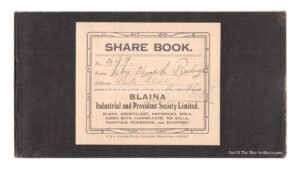 Independent Co-operative Stores.
Independent Co-operative Stores.
The small independent branches of the Co-operative Stores were located as follows – Victoria Street Blaenau Gwent, Tillery Road Cwmtillery and Gwern Bethi Road Cwmtillery and Penybont Cwmtillery. Other larger branches were located at Brynmawr, Llanhilleth, Newbridge, Crosskeys, Six Bells and Risca. The share book (as seen right) was owned by Mrs Mary Elizabeth Rawlings of Park Street, Cross Keys, Monmouthshire. The book was started in March 1920 and shows purchases or checks returned, the rate of dividends, interest, deposits and contributions, all signed off by – Mr D. Moseley, Mr D. Powell and Mr M. Proll.
The Co-operative C.W.S. Industrial Provident Society Milk Trade.
In 1932 the Co-operative C.W.S. began a milk trade.
The New Shops at the Co-operative Store, Abertillery.
On Friday 23rd of June 1939, a new department was officially opened at the Abertillery Co-operative Store. The South Wales Gazette reported on the new building adjoining the Abertillery Store. This new block had originally been a small row of cottages but were purchased by the Co-operative Society when the store was first constructed, they were used as shops and now formed part of the society’s store. The report stated that Mr R. H. Eke, Assistant Surveyor to the Abertillery Urban District Council had designed the new premises, which included which included departments for mantles, millinery, drapery, soft furnishings, footwear and men’s wear. The building was equipped and furnished by various branches of the Co-operative Movement, the new building was built by the Society’s Works Department, the shop fronts were supplied by the C.W.S. Limited who also had the contract for the electric light installations. The floor coverings came from the Scottish Wholesale Society’s factory at Falkland, the contractors who helped in the interior construction were the Gameson Bros of Nantyglo and Mr R. Williams of Brynmawr. It was stated that there were further plans to modernise the store in the near future. The manager of the Abertillery Co-operative Store at this time was Mr J. H. Godwin.
The Merger of the Smaller Branches.
On Tuesday 2nd of April 1940, the Cwmtillery Industrial Co-operative Society Ltd merged with the Blaina Industrial and Provident Society Ltd. The Cwmtillery Society had branches at Victoria Street Blaenau Gwent and Penybont. Councillor D. Walters (Chairman) with Mr L. Cox as (Managing Secretary). Under the merger Councillor D. Waters and Mr E. G. White (Member of the Board of Directors at Cwmtillery) obtained seats on the board of the Blaina Society.
Mr F. Denholm
In 1951 Mr F. Denholm was manager of the Abertillery Co-operative Industrial Provident Society Store.
Mr J. Jonathan.
In 1955 Mr J. Jonathan was manager of the Abertillery Co-operative Industrial Provident Society Store.
The Name Change to the Co-operative Retail Services Limited.
In 1957 the name of the Co-operative Stores C.W.S. was changed to the Co-operative Retail Services Limited C.R.S. and the Co-operative enterprise began expanding, enlarging and modernising their stores.
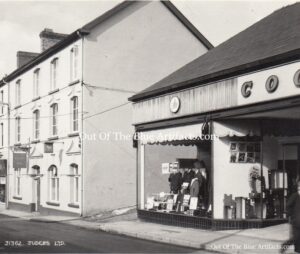 The Modern Store Church Street.
The Modern Store Church Street.
On Thursday 4th of December 1958, the newly modernised Co-operative Store at Church Street, Abertillery (as seen left) was officially opened. In front of large crowds, the new store under the enterprise now called Co-operative Retail Services Limited known as C.R.S. was officially opened by Councillor Walter Jones who commented on the up-to-date planning which included a self-service department of the most modern design. Mr Jones was accompanied by Councillor H. S. Snellgrove J.P., (Chairman of the Abertillery Council) Mr Snellgrove said the new premises would enhance Abertillery’s reputation as a first-class shopping centre.
Both councillors paid tribute to Mr J. Jonathan (Managing Secretary of the Blaina branch and Mr B. France (Dry Goods Officer) Councillor Jones said they and members of staff had worked day and night to effect the alterations. Mr Jonathan spoke of how the Abertillery branch was now the finest in the valley and expressed his appreciation to all who had helped to make it so.
The opening advertisements stated a free parcel of groceries to the value of five-shillings to be given to the first 500 customers “Purchasing groceries and provisions over the value of one-pound or more”. Also “One-shilling in the pound discount on all merchandise other than opening offers”.
The Proposed Closure of the Co-operative Retail Store.
In March 1984, the Gwent Gazette reported on the possible closure of the Co-0perative Retail Store at Brynmawr. After the recent closure of the Tredegar store, the Brynmawr Town Council were looking reassurances from the company. In the same report, it stated that the fate of the Abertillery Co-operative Store was still undecided.
The Council’s Offer to Assist the Company.
On Thursday 26th of April 1984, the Gwent Gazette reported that the Abertillery councillors were desperately trying to arrange a meeting with Co-op’s top officials in a bid to save the Co-op Stores at Abertillery. The Blaenau Gwent Borough Council were prepared to assist the Co-op in any way possible if it remained open. The council had already held a meeting with local Co-op officials about the matter but they were now trying to arrange a meeting with the store’s head office in Manchester.
The Closure of the Co-operative Retail Store at Abertillery.
In May 1984, the Gwent Gazette reported that the Co-operative Retail Store at Abertillery had closed. There were no other reports other than the fact that seventeen jobs were lost at the time of closure.
Rayglow Securities.
In February 1985, the Gwent Gazette reported on the Rayglow Securities were obtaining planning permission to purchase the old Co-op Store, Abertillery and transform the building into six new shops under the Town Centre Redevelopment Scheme.
The Later Years.
The building and extension at street level was converted into small retail shops, accessed from the street, with the main structure above being converted into residential flats.
 Out Of The Blue Artifacts A Library of a lifetime of collecting
Out Of The Blue Artifacts A Library of a lifetime of collecting
